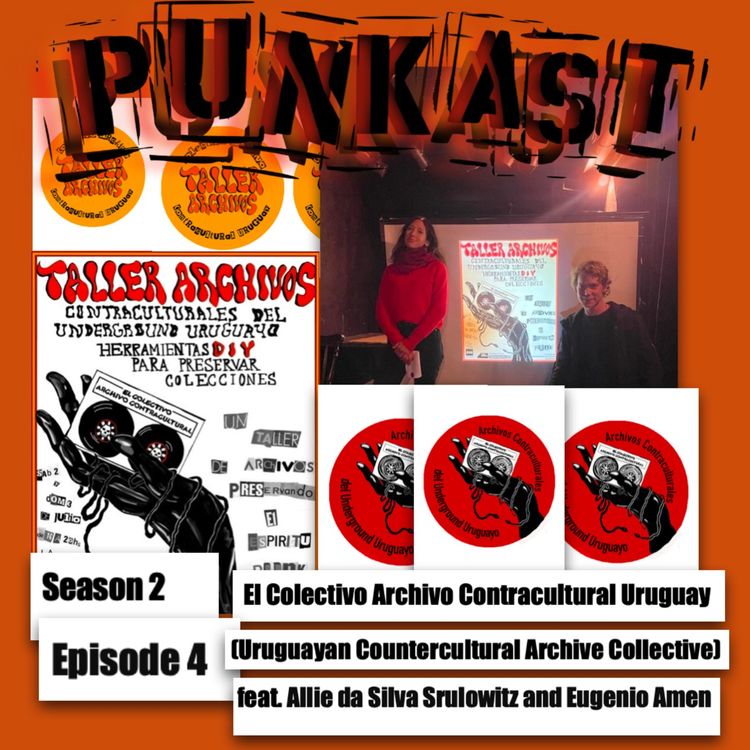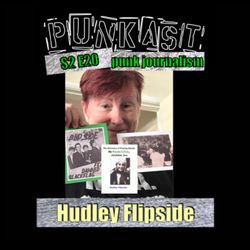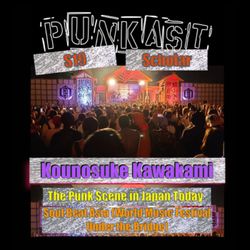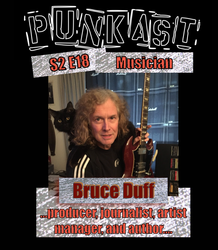Share

Punkast
Colectivo Archivo Contracultural Uruguay (the Countercultural Archive of Uruguay) feat. Allie da Silva Srulowitz and Eugenio Amen
In this episode, Jessica Schwartz speaks with the founders of Colectivo Archivo Contracultural Uruguay (the Countercultural Archive of Uruguay, CAC): Allie da Silva Srulowitz and Eugenio Amen. CAC is a collective focused on the recovery, preservation, digitization and access to the different materials that emerged from the Uruguayan underground countercultural scene of the 1970s to 2000s. CAC promotes meetings and exchanges between the community and archivists, in order to share experiences and knowledge about the treatment and accessibility of various media saved within their personal collections. One of the main objectives of the “Colectivo Archivo Contracultural" is to support the community to preserve their collections and raise awareness of the importance of preserving underground, punk, and often lesser-heard memory. Da Silva Srulowitz and Amen intend to expand CAC with the participation of those involved in the project, prioritizing a representative and diverse collective as well as integrating histories, by listening and visualizing community collections, moving out of heteronormativity and the patriarchal model, and inclusive of women, queer, trans, Afro-Uruguayan, immigrant, and indigenous communities.
Links
Colectivo Archivo Contracultural: https://linktr.ee/archivocontracultural
Instagram: https://www.instagram.com/archivocontracultural/
Email: colectivoarchivocontracultural@gmail.com
Mamá era punk: An important document of the Uruguayan underground community: https://www.youtube.com/watch?v=l822azA0cXg
Songs
Monkelis - “Yam”
Polución Sonora - “Su Consciencia”
4F Ciudad Junk - “Love”
Chicos Eléctricos - “Don’t Look Back (Demo)”
Motosierra - “F.U.C.K.”
3D - “Desorientada”
This episode was hosted and produced by Jessica Schwartz and edited by Erika Pesca.
More episodes
View all episodes

23. Kristy Martinez with XTINE RECKLESS and CELESTE
01:13:30||Season 2, Ep. 23PUNKAST BACK TO SCHOOL MINISERIES SPECIAL!“SoCal music spaces: Scene, Emo, and EDM ” (part 2 of 3)Here at the Punkast, we're continuing our special summer-to-fall mini-series with guest host Kristy Martinez, a PhD Candidate in Musicology at UCLA , bringing special guests - per Kristy's introduction: 'In these interviews, we meet with some of the early 2000s scene and emo kids in SoCal. This episode is made to highlight the contributions of women creatives and music promoters. First, part one of our interview is with Xtine Reckless of Xtine and the Reckless Hearts, a musician of the band Pretty in Stereo, who were part of a very viral Fox 11 news clip on television about the sensationalism of emo and scene kids in California. Xtine is influential to the LA rock scene with her previous band and current band, Xtine and the Reckless Hearts. Celeste, a friend from high school in El Monte, was early on with a unique scene-raver look and frequented many of the Myspace-famous nightclubs. Celeste is a promoter and has experience in music. In the early 2000s, Celeste appeared in various photobooth night club photos like DANCE and was an important promoter for events such as Nocturnal.'Bands/Artists mentioned: Pretty in Stereo, Xtine and the Reckless Hearts, Silverstein, Showbread, Garbage, Chiodos, Lunachicks, Thursday, Fear Before the March of Flames, Saosin, Taking Back Sunday, Underoath, Hot Water Music, My Chemical Romance, Saves the Day, Oh Sleeper, A Skylit Drive, Dance Gavin Dance (Kurt Travis), Jem and the HologramsGuest Bios. Xtine is a vocalist, guitarist and essential figure in the OC and LA rock scenes with her previous band Pretty in Stereo, and currently is in the band Xtine and the Reckless Hearts. Xtine has played Vans Warped Tour, and various iconic venues and spaces in SoCal. // Celeste is a psychology major and lifelong music lover, who grew up in the golden era of emo, hardcore, and screamo, living the scene lifestyle, and later explored early 2000s electro and house, leading into the rise of EDM.LinksIG: Indigenouspunxarchive 𝚇𝚝𝚒𝚗𝚎 & 𝚃𝚑𝚎 𝚁𝚎𝙲𝚔𝙻𝚎𝚂𝚜 𝙷𝚎𝙰𝚛𝚃𝚜® IGPretty In Stereo | SpotifyPretty In Stereo IGPretty in Stereo Last FMNocturnal Wonderland Polite in Public-We’d love to hear from you and are soliciting episode ideas and guests. IG: punkastuclaEmail: punkastucla@gmail.com The Punkast theme music is excerpted from “Bitchathon” by Lady Bits. All rights reserved. This episode was recorded on August 6, 11, and 12, 2025, on Zoom. Kristy Martinez hosted and co-produced this episode with Jessica Schwartz. Bella Gerard provided editorial assistance. Martinez edited the audio-synced transcript, available here.
22. Kristy Martinez with JASE FELDER
53:38||Season 2, Ep. 22PUNKAST BACK TO SCHOOL MINISERIES SPECIAL!“Alternative in the I.E. 2000s and more in the Inland Empire” (part 1 of 3)If you couldn't already tell by the title for Part 1, we, here at the Punkast, have a REALLY special summer mini-series for you! Your regular host, Jessica Schwartz, is handing the mic over to Kristy Martinez, a PhD Candidate in Musicology at UCLA and the OG TA for UCLA's "Punk" online course, who does amazing, compelling work (see 'host bio' below), and is bringing exciting guests into the Punkast mix for your 'back to school' listening and learning. Anyways...Here's Kristy's introduction to this episode: Jase Felder grew up in Moreno Valley and Riverside. As a BIPOC and gay man, Jase was heavily involved in the punk, indie, and dancey electro scenes in the Inland Empire. We discuss living in the I.E., punk at the Showcase theater, 2000s dance “scene” clubs, the rise of social media, as well as influential artists and soundtracks. And, amidst all that, Kristy and Jase provide the punk+ talk & tunes to supercharge your 'back to school' punk podcast playlist. Bands/Artists mentioned: The Bravery, AFI, Lady Gaga, Interpol, The Bled, Taking Back Sunday, Shiny Toy Guns, Dashboard Confessional, The Voids, Bloc Party, RihannaGuest Bio. Jase Felder was born an Inland Empire It Girl turned regular New Yorker. I look back on growing up in San Bernardino/Moreno Valley and think, it was pretty badass. However, you kind of have to leave it to really love it. The food, the music, the house parties, the mixed-culture, …Bakers—it all hits. I graduated in ’05 from Canyon Springs High School, did some time at RCC, which, by the way, is still one of the most beautiful college campuses I’ve seen (at least during my stint), and did what most of us from the area eventually do and moved. My choice: New York City. Since 2011, I’ve been in Brooklyn, living with my super chill Bull Terrier. I earned my Master’s in Public Health Policy and now work as an Infectious Disease Researcher at NYU’s Bellevue Hospital. It’s a long way from being carried out of Club VIP for doing the absolute most.Host Bio.Kristen Martinez (she/her/they) is a UCLA PhD Candidate in Musicology as well as a vocalist, mother, and archivist. Growing up in El Monte, her work examines subcultural movements in the San Gabriel Valley as well as ephemera, nostalgia, placemaking, musical analysis, and identity with a focus on punk, post-punk, and emo. She has created a D.I.Y. digital punk archive to document the various global Indigenous music movements called the "Indigenous Punx Archive" on Instagram. IG: Indigenouspunxarchive LinksIG: Indigenouspunxarchive remembering ezzat soliman | Jerk of All TradesVIP-Nightclub.com-We’d love to hear from you and are soliciting episode ideas and guests. IG: punkastuclaEmail: punkastucla@gmail.com The Punkast theme music is excerpted from “Bitchathon” by Lady Bits. All rights reserved. This episode was recorded on July 2, 2025 on Zoom. Kristy Martinez hosted and co-produced this episode with Jessica Schwartz. Martinez and Schwartz edited the audio-synced transcript, available here.
21. Paul Fields
47:39||Season 2, Ep. 21'[Punk] is a music genre and a subculture and a whole way of living that is full of contradictions, hypocrisy…’ Does punk promote inclusion or exclusion? Violence or protection? And what about health, accessibility, self- and communal care? Join Jessica Schwartz and PAUL FIELDS for this special interview in three parts as they discuss his research on punk and the sometimes contradictory ideals in the scene and academia.Guest Bio. Paul Fields is an associate professor at Buckinghamshire New University where he teaches various music-related courses such as Songwriting and Music Production and Events Management. His research is largely focused on punk, drawing from his own experience in the scene during the 1990s and 2000s.LinksPaul Fields’ research repositoryPaul Fields’ university email: paul.fields@bnu.ac.uk-As mentioned in the introduction, click links to find more about the Punk Scholars Podcast, on which Francis Stewart's episode and many others are featured!-We’d love to hear from you and are soliciting episode ideas and guests. Instagram: punkastuclaEmail: punkastucla@gmail.com The Punkast theme music is excerpted from “Bitchathon” by Lady Bits. All rights reserved. Season 2, Episode 21 was recorded in person on December 20, 2023, December 12, 2024, and August 6, 2024 in the UK and US, respectively. Jessica Schwartz hosted and produced this episode. Bella Gerard edited the audio and transcript, which is available here.
20. Hudley Flipside
53:47||Season 2, Ep. 20“For me punk rock is really the song.” For some, punk means destruction and revolt; for others, it means DIY and community. In this episode, Jessica Schwartz and Tequila Mockingbird are joined by HUDLEY FLIPSIDE to explore her perspective on punk garnered from her formative Flipside zine-and-scene building experiences in the early LA scene.Guest Bio. Hudley Flipside 'HUD' is a versatile artist, filmmaker, writer, and publisher with a diverse background in punk culture and journalism. She is known for her involvement in various creative endeavors, including blogging, documentary filmmaking, and co-owning the punk rock fanzine Los Angeles Flipside Fanzine.LinksHudley Flipside: books, biography, latest updateThe Seminary of Praying Mantis Publishing (Hudley Flipside’s Portfolio) Los Angeles Flipside Fanzine Narrative Documentary Film. “Epeisodion One, Two and Three-We’d love to hear from you and are soliciting episode ideas and guests. Instagram: punkastuclaEmail: punkastucla@gmail.com The Punkast theme music is excerpted from “Bitchathon” by Lady Bits. All rights reserved. Season 2, Episode 20 was recorded on August 1, 2024, on Zoom with participants in the US. Jessica Schwartz and Tequila Mockingbird co-hosted and co-produced this episode. Bella Gerard edited the audio and transcript, which is available here.
19. Kounosuke (Ko) Kawakami
47:06||Season 2, Ep. 19“Make festival, not war. Soul Beat Asia. In which what doesn't exist, we recreate together.”Join Jessica Schwartz in conversation with guest Dr. Kounosuke (Ko) Kawakami from Kurashiki University (Japan) that began as a talk, “The Punk Scene in Japan Today: Soul Beat Asia (World Music Festival Under the Bridge)” and wove its way into an inspired contemplation on belonging and misfitting, DIY punk as intergenerational practice, politics, infrastructure and importance of DIY festivals, and a host of other punk philosophical considerations vital to our local and transnational punk (and punk scholarly) communities. Bio:Dr. Kounosuke (Ko) Kawakami is a researcher, curator, and currently Associate Professor at the Kurashiki University of Science and the Arts in Japan. My specialty is contemporary art, curation and popular music. My publications include 'Genealogy of Punk' , "The Idea of Anarchism" and "Culture of Expression Research Lectures" 2024. Punk Playlist, courtesy of Dr. Kawakami:1. Isidore Isou Venom and Eternity (1951)Guest Note: “This is a film, but the song playing in the background is a poem by Lettrism”2. "Take the gun" by Zuno Keisatsu(Brain Police)Guest Note: Zuno Keisatsu made their record debut in 1972, at the end of the period of intensified political movements by the New Left, Zenkyoto, and Zengakuren. Their politically radical lyrics, which challenged taboos, and radical live performances led to episodes of broadcast censorship and exclusions from concert venues. The name was taken from the title of the song "Who Are The Brain Police?" by Frank Zappa's3. Turtle Island (2016)Songs Used(0:00-0:55) Order. “Neo Humanity.” Punk Navigation, Overthrow Records, 1996.(0:00-0:44) Hi-Standard. “The Sound of Secret Minds.” Angry Fist, Fat Wreck Chords, 1997.(0:00-0:44) Zunou Keisatsu. “銃を取れ.” 頭脳警察1, Be-Witch Record, 1975.Recorded on February 15, 2024, this episode was part of the UCLA online course “Punk: Music, History, (Sub)culture,” open to a live student audience. It was hosted and produced by Jessica Schwartz. Bella Gerard edited the audio and the transcript.
14. REPOST: Robby Krieger
48:26||Season 1, Ep. 14"In 1967, Robby Krieger, the guitarist for L.A. band the Doors, wrote the hit single “Light My Fire” in the living room of his parents’ Pacific Palisades home. This week, nearly six decades later, the lyrics took on a disturbing resonance as the structure where the music originated burned to the ground." (Amy Kaufman, LA Times, 1/11/2025)Recent LA Times headlines:"The Doors’ hit ‘Light My Fire’ was written in Pacific Palisades home that burned"1/11/2025"Former Morrison Hotel, made famous by a Doors album, destroyed by fire in downtown L.A." 12/27/2024Devastating fires have destroyed lives, communities, and historical sites of memory in Los Angeles. I decided to hold off on posting the first release of the year to share this episode of my conversation with Robby Krieger and Tequila Mockingbird, given two fires - the massive Palisades fire and one that began in downtown LA a couple of weeks prior -greatly impacted two of these sites of memory of one of LA's most influential rock bands, the Doors, now considered a proto-punk band to many. I repost this episode from a few years back as an homage to these places, now destroyed, and the memories--and many others--that will carry on with the people, the music, and the communities that hold them dear and will help them persevere. With love (to/from) LA - the Punkast Team. --Original description: Increasingly, people recognize the LA band, the Doors, for their wide-ranging influence on punk, notably inspiring Iggy Pop, Patty Smith, X, Joy Division, Siouxsie, and the Banshees. In this episode, we speak with the Doors’ venerable guitarist and song-writer, Robby Krieger, to learn about his musical journey, contemplate how the Doors shaped punk, and share some of his more recent work, including collaborations with the seminal LA punk bands X and the Mau Mau’s. Inducted into the Rock ‘n’ Roll Hall of Fame and named one of the 100 greatest guitarists of all time by Rolling Stone, Krieger wrote or co-wrote some of the Doors’ most famous songs, including “Light My Fire” and “Love Me Two Times.” Guest commentator David Schwartz offers personal reflections and political context to situate the intergenerational impact of the band. Songs Excerpted:(0:51-1:16) The Doors. “The End.” The Doors, Elektra Records, 1967.(0:04-0:26) Chuck Berry. “Johnny B. Goode.” Johnny B. Goode, Chess, 1958.(0:26-0:58) The Doors. “Break On Through (To the Other Side).” The Doors, Elektra Records, 1967.(0:02-0:35) The Doors. “Seminary School.” The Soft Parade, Elektra Records, 1969.(0:24-0:43) The Doors. “Light My Fire.” The Doors, Elektra Records, 1967.(0:00-0:18) The Doors. “People Are Strange.” Strange Days, Elektra Records, 1967.(0:19-1:23) The Doors. “Horse Latitudes.” Strange Days, Elektra Records, 1967.This episode was co-produced and co-hosted by Jessica Schwartz and Tequila Mockingbird, with audio editing and cover art by Cheska Zaide. Bella Gerard edited the audio-synced transcript, which is available HERE.AUDIO REPOSTED from OCT. 2021.
18. Bruce Duff
35:45||Season 2, Ep. 18“The music of which there was supposed to be no rule book, suddenly had a rule book…” So, what are these rules, how do they impact creativity, and how do musicians, producers, and artists, more broadly, continue to push the limits in Los Angeles’ dynamic DIY musical subculture? Join Jessica Schwartz and Tequila Mockingbird as they speak with BRUCE DUFF about his experiences as he addresses students’ questions about this complicated terrain. Bio:A musician, producer, journalist, artist manager and author, Bruce Duff is a native of Southern California. As player and producer, he’s worked with Jesters of Destiny, Cheetah Chrome, Adz, Circle, Glitter Wizard, Jeff Dahl, Prima Donna, 45 Grave, the Streetwalkin’ Cheetahs, the Magnificent, Thor and Simon Stokes, among many others. As a journalist, he wrote for L.A Weekly, Billboard, Bass Player, Psychotronic, Rip, Creem, and dozens of other out-of-print magazines. He retired from journalism in 1995. His first and last book The Smell of Death was published in 2014. In addition to artist management, he runs the day-to-day operations of Josie Cotton’s Kitten Robot Records label. Duff lives in the Hollywood Hills with his wife Else aka Evil E, (the official announcer of the L.A. Derby Dolls), and their two cats Lemmy and Lux.Links:http://bruceduffmusic.com/Audio Samples:Mother Superior. “Deep.” Deep, Top Beat Records, 1998.45 Grave. “Sleep in Safety.” Phantoms E.P., Enigma, 1983.Various Artists. “Flatten the Curve.” FugThaCorona, 2020.CrowJane. “The Pharmacy.” Mater Dolorosa. 2022.Recorded on November 30, 2023, this episode was part of the UCLA course “DIY: Punk Organizing as Social Justice,” open to a live student audience. It was hosted and produced by Jessica Schwartz and features co-host and guest producer Tequila Mockingbird. Bella Gerard edited the audio and transcript.
7. AdobePunk: Behind the Scenes
01:02:30||Ep. 7This “Behind the Scenes” episode is the final episode in the PUNKAST/Adobe Punk: the concert Mini-Session Interview series. It features Jessica Schwartz in conversation with Theresa Chavez, Gabriel Garza, Dorothy Hoover, and Sage Lewis, who discuss their inspirations and contributions to Adobe Punk’s creation and production. Theresa Chavez highlights About Productions' collaborative approach, which has been building projects from the ground up for decades. Gabriel Garza emphasizes the intergenerational and historical aspects of Adobe Punk, while Dorothy Hoover and Sage Lewis elaborate on the set design and soundscapes, respectively. The conversation touches on future plans for the production and educational outreach efforts, aiming to deepen the connection between youth and historical and cultural contexts through the medium of punk theater.For more information: https://www.aboutpd.org/adobe-punkDorothy Hooverhttps://www.dorothyhoover.com/IG: _dorothyhooverGabriel Garzahttps://gaberealgarza.com/IG: gaberealgarzaSage Lewishttps://sagelewismusic.com/IG: sagelewisSong Samples: “Sound Collage” constructed by Sage Lewis for Adobe Punk, 2022.“Camera Shy,” Theresa Chavez and Nina Diaz, 2022.Interview Transcript: https://sonix.ai/share/SahkVXNiMPtBJRz1v67ZY1W2This episode was recorded over Zoom on May 23, 2004. Bella Gerard edited the audio and transcript.
6. AdobePunk: Jimmy Alvarado
20:05||Ep. 6Jimmy Alvarado has been active in East L.A.’s underground music scene since 1981 as a musician, backyard gig promoter, writer, poet, bouncer, flier artist, photographer, podcaster, and historian. He has authored numerous interviews, articles, and shorts spotlighting the East Side scene, and an episode of his Eastside Punks documentary series about first-wave East L.A. punk band The Brat was named best documentary short at the 2020 Highland Park Independent Film Festival. He writes for Razorcake and also plays guitar in the bands La Tuya and Our Band Sucks. Alvarado says “while punk has been an inspiration and refuge to many in Los Angeles County, precious little attention has been given to the greater Eastside’s contribution to the scene until very recently. A rich diverse, multi-generational, multi-disciplinary group of artist are now being heard, through a variety of avenues, resulting in a more holistic history of the Eastside, and Los Angeles, underground music scene that counters the long prevailing myth that punk has always been a ‘straight white boy thing’.” Visit latuya.bandcamp.com and razorcake.org for more information.Links:latuya.bandcamp.comrazorcake.orgSong Samples:(0:00-0:20) La Tuya, “La Tuya,” La Tuya, 2019.(0:00-0:39) Patti Smith, “Gloria,” Horses, Arista Records, 1975. https://www.youtube.com/watch?v=bPO0bTaWcFQ (0:00-0:35) La Tuya, “Thirteen,” La Tuya, 2019.(0:10-0:45) La Tuya, “Tribes,” La Tuya, 2019.Interview Transcript: https://sonix.ai/share/uUxv73Bv8cdKBcHG6fdvo7AhThis episode was recorded on March 24, 2024, in Pasadena, in front of a live audience at the Lineage Performing Arts Center. Bella Gerard edited the audio and interview transcript.